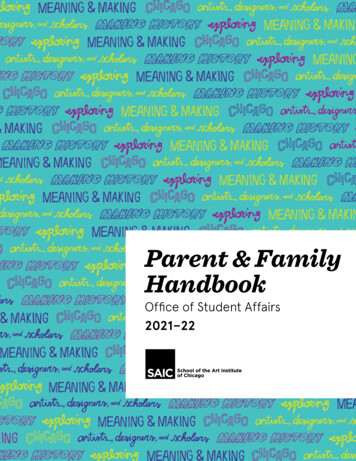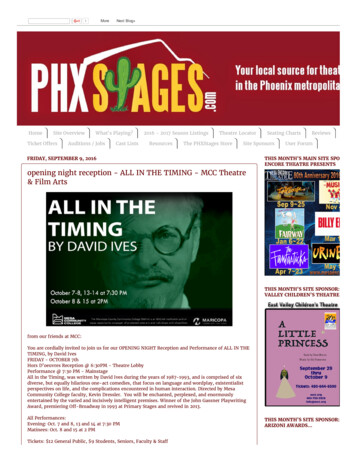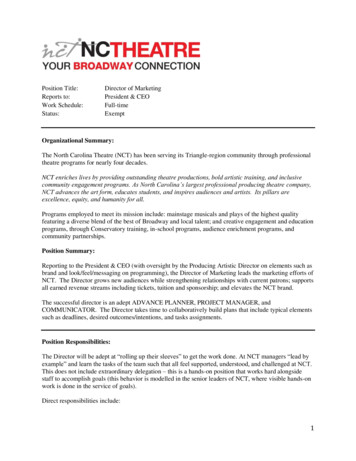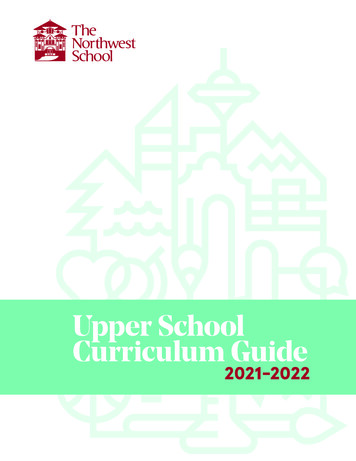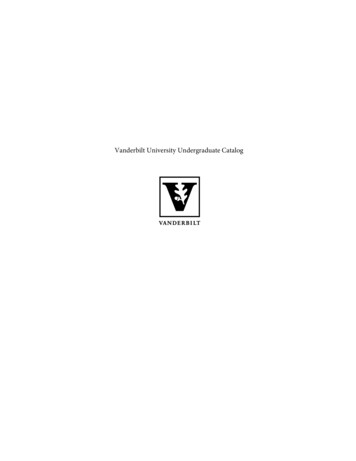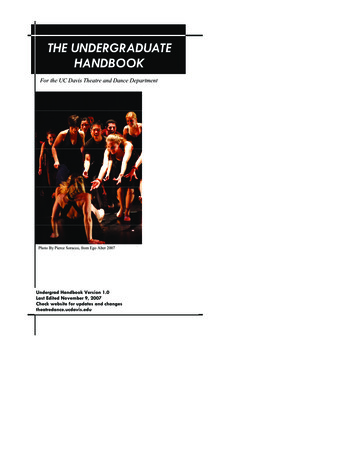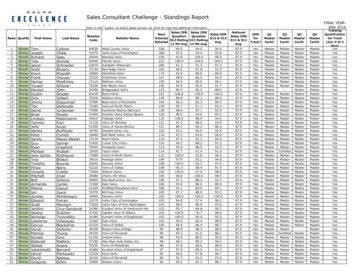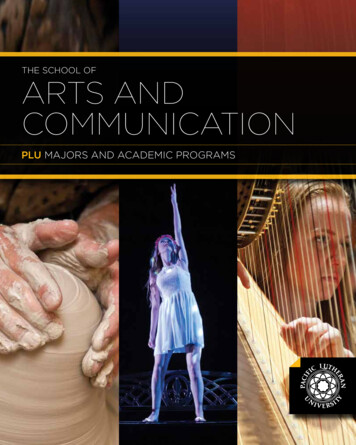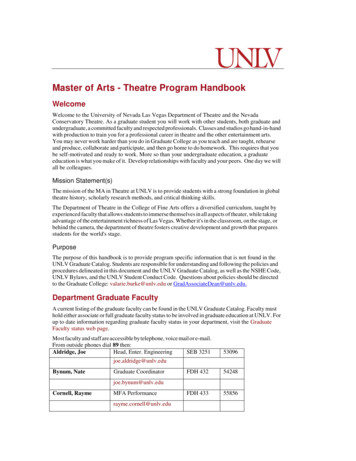
Transcription
Master of Arts - Theatre Program HandbookWelcomeWelcome to the University of Nevada Las Vegas Department of Theatre and the NevadaConservatory Theatre. As a graduate student you will work with other students, both graduate andundergraduate, a committed faculty and respected professionals. Classes and studios go hand-in-handwith production to train you for a professional career in theatre and the other entertainment arts.You may never work harder than you do in Graduate College as you teach and are taught, rehearseand produce, collaborate and participate, and then go home to do homework. This requires that yoube self-motivated and ready to work. More so than your undergraduate education, a graduateeducation is what you make of it. Develop relationships with faculty and your peers. One day we willall be colleagues.Mission Statement(s)The mission of the MA in Theatre at UNLV is to provide students with a strong foundation in globaltheatre history, scholarly research methods, and critical thinking skills.The Department of Theatre in the College of Fine Arts offers a diversified curriculum, taught byexperienced faculty that allows students to immerse themselves in all aspects of theater, while takingadvantage of the entertainment richness of Las Vegas. Whether it's in the classroom, on the stage, orbehind the camera, the department of theatre fosters creative development and growth that preparesstudents for the world's stage.PurposeThe purpose of this handbook is to provide program specific information that is not found in theUNLV Graduate Catalog. Students are responsible for understanding and following the policies andprocedures delineated in this document and the UNLV Graduate Catalog, as well as the NSHE Code,UNLV Bylaws, and the UNLV Student Conduct Code. Questions about policies should be directedto the Graduate College: valarie.burke@unlv.edu or GradAssociateDean@unlv.edu.Department Graduate FacultyA current listing of the graduate faculty can be found in the UNLV Graduate Catalog. Faculty musthold either associate or full graduate faculty status to be involved in graduate education at UNLV. Forup to date information regarding graduate faculty status in your department, visit the GraduateFaculty status web page.Most faculty and staff are accessible by telephone, voice mail or e-mail.From outside phones dial 89 then:Aldridge, JoeHead, Enter. EngineeringSEB 325153096joe.aldridge@unlv.eduBynum, NateGraduate CoordinatorFDH 43254248FDH 43355856joe.bynum@unlv.eduCornell, RaymeMFA Performancerayme.cornell@unlv.edu
Program HandbookCross, LezlieHistory & Dramatic LitFDH 40553330FDH 40853666FDH 40651059JBT 5551177JBT 5353665FDH 40753666FDH 40153869FDH 40753866FDH 43653659lezlie.cross@unlv.eduFrayer, BrackleyDept Chair, Lightingbrackley.frayer@unlv.eduGilyard, ClarenceMFA Performance, Filmclarence.gilyard@unlv.eduHansen, ScottTechnical Directorscott.hansen@unlv.eduHertfelder, KatrinaCostume Shop Supervisorkatrina.hertfelder@unlv.eduHobbs, KimAdministrative Assistant IIIkim.hobbs@unlv.eduHubbard, PhilHead, MFA Performancephilip.hubbard@unlv.eduLee, ToniAdministrative Assistant IVtoni.lee@unlv.eduLugering, MichaelMFA Performancemichael.lugering@unlv.eduProgram InformationMaster of Arts - TheatreContact Informationhttp://www.unlv.edu/theatreDepartment ChairBrackley Frayer, Office Locations: FDH 409, HFA 228, Email: brackley.frayer@unlv.eduGraduate CoordinatorNate Bynum, Office Location: FDH 402, Email: joe.bynum@unlv.eduDepartment Main OfficeOffice Location: FDH 410, Phone: 702-895-3666, Fax: 702-895-0833Program RequirementsProgram requirements regarding admission, coursework and culminating experience are found in thegraduate catalog.2
Program HandbookThe Road to an MFAYour Faculty Advisor will help you determine an appropriate curriculum. At several steps along the way formsare required by the Graduate College. When any form issubmitted to the Graduate College, ask the receptionist inthe College for a date stamped copy. Please make a copyof any form for the Department office as well.The first of these steps is choosing an Advisory Committee.This should be done after completing 12 credits (onesemester full-time). Your committee may makerecommendations on curriculum and will follow yourprogress toward graduation. In your final semester, youwill assemble this committee to discuss and/or defendyour culminating experience. Your committee consists ofyour Faculty Advisor, two Theatre faculty members ofyour choice, and one graduate faculty member of yourchoice from outside the department. If you are notfamiliar with faculty in other departments, speak toyour Faculty Advisor for suggestions.After establishing a graduate advisory committee, ifthere is need to change the composition of thecommittee, the student should complete and submit aChange in Advisory Committee form to theGraduate College immediately.By the end of your second semester, you submit to theGraduate College your Proposed Masters &Specialist Degree Program . This is a two-part form.Part 1 asks for your Degree Option. Discuss this withyour Faculty Advisor. It is most likely a Professional orScholarly Paper, a Creative Project or a Final Exam.Part 2 should be completed with the assistance of yourfaculty advisor. Here you list classes that you have or willtake in each semester. Keep in mind that the classes listedin the Graduate Catalog are preceded by the phrase: “Arecommended course of study might include:”. This allowsflexibility in course selection. However, all graduate students are required to take THTR 702 Graduate Seminar forseveral semesters. Should your projected classes change,you must complete and submit a Change in ProposedDegree Program.3
Program HandbookThe road to an MFA in Theatre concludes with a “culminatingexperience”. In the Performance area this consists of a finalexam and an Industry Showcase. In Design, Technical Directionand Stage Management the Culminating Experience is a creativeproject and/or a professional paper. This project or paper isfrequently related to a production assignment on an NCT show.Once this is determined in discussion with the Faculty Advisor,you must submit a Prospectus Approval form to the GraduateCollege. This form is accompanied by a brief description (1-3pages) of the project, the circumstances, processes and materialsthat will be used. A formal style in the third person is preferred.Use active voice verbs and a writer's voice that demonstratesconfidence that the project has merit.As you work on your project or paper, consult regularly withyour advisor to make sure you are on the right track. Setdeadlines with your advisor including a date to submit a firstdraft to your advisor, a date to submit a final draft to your advisor, a date to submit the completedproject to your committee and a date for the Oral Defense. Keep in mind that your committee needsto receive your paper at least two weeks before the Oral Defense. Once a date and location for theDefense have been set, it must be publicized within the department as the Defense is open to anyonewho wishes to attend. If your area has a required reading list, part of your oral may consist ofquestions from that list.In all areas, the final form that must be submitted to theGraduate College is the Culminating Experience Results. Thisform must be submitted no later than two weeks before the lastday of classes. Do not forget to apply for graduation inMyUNLV – this may be done anytime in your final year.Most forms submitted to the Graduate College requiresignatures of the advisor, committee members, our GraduateCoordinator, Nate Bynum (FDH 432), and by the Dean of theCollege of Fine Arts, Dr. Jeffrey Koep (CDC Bldg 12).All forms shown in this handbook may be found at theGraduate College website with the exception of Part 2 of theProposed Degree Program. It may be downloaded atwww.unlv.edu/theatre/programs/graduateAdvisory Committee GuidelinesIn consultation with his/her advisor, a student will organize a thesis committee of at least threedepartmental members. In addition, a fourth member from outside the department, known as theGraduate College Representative, must be appointed. An additional committee member may be addedat the student and department’s discretion.Degree Program BenchmarksComprehensive Exams: This take-home, written examination will be held in week ten of springsemester during the student’s first year of the program. The exam will be drawn from a reading list of15-20 titles chosen by the student from the master MA reading list. An oral examination of the examand the student’s thesis prospectus will occur in week 14 of spring semester. Students who fail to passthe exam will be placed on academic probation. A student will also be placed on academic probationif a minimum 3.00 grade point average is not maintained in all work taken as part of the graduatedegree program.4
Program HandbookThesis: Students will spend their second year writing a 50-75 page scholarly thesis on a topic of theirchoosing. The M.A. thesis should be an original contribution of knowledge about a suitable dramaticor theatrical subject. An oral defense of the thesis will be held in week 9 or 10 of spring semester.Program Timeline Year Oneo Fall Spring Year Twoo Fall o Spring Prepare reading list for examo Thesis proposal due by the end of week 10.First year exam given in week 12.Oral defense of exam and thesis proposal.Begin work on thesisComplete thesis by mid-semester (week 8).Thesis defense held during week 9 or 10.Professional Code of Ethics/Discipline GuidelinesUNLV Graduate College policy regarding academic integrity can be found in the graduate catalog.Annual Review ProceduresEach spring term, graduate students are required to complete the Graduate Student Annual Reviewsurvey. This survey will be sent by the Graduate College to the student’s Rebelmail account. Thereview covers the prior calendar year and assesses student progress while setting goals for the yearahead. The student’s classroom performance and first year exam is the basis for the review during thefirst year of the program and successful completion of remaining credits and the thesis is the basis forreview in the second year.ProbationIf a student fails to successfully progress in their degree program, their department/school will recommend thatthe student be placed on probation by the Graduate College. Students on probation may be dismissed/separatedfrom their program for failing to successfully meet the conditions of their probation by the deadline provided.Please see the Probation and Separation section of the Graduate Catalog for more information.Additional Program InformationThe Nevada Conservatory TheatreThe Nevada Conservatory Theatre is the producing arm of the Department ofTheatre. Its mission statement is:To create a vital and dynamic theatre that enriches and challenges the artistic and cultural life ofthe city of Las Vegas and the desert Southwest, while simultaneously training students to shapeand direct the theatre of the 21st century. To accomplish this goal, we employprofessionals to work side by side with students. Many of our faculty also havesubstantial professional resumes and participate in production. We have a Board ofAdvisors drawn from members of the community who enthusiastically support uswith both financial and service contributions. Their efforts are guided by ourArtistic Director and Executive Director/Chair. The Friends of the NevadaConservatory Theatre are volunteers that help with ushering and marketing. Wehave created a loyal subscription audience who enjoy watching your growththrough your time here. If you encounter board members, friends or patrons in thetheatre or the grocery store, thank them for their help and support.5
Program HandbookProductionThe Department of Theatre will produce eight productions during the 2013-14 academic year. (Seeback cover for titles and dates.) Five of these are in the Judy Bayley Theatre and are the Main Seasonof the Nevada Conservatory Theatre. They are fully mounted with large budgets and full staffing.These productions typically rehearse 4-5 weeks.The three plays in the Black Box Theatre are known as the Alternative Season. All are moderatelymounted with limited budgets and crew. Typical rehearsal is 4-5 weeks.The Paul Harris Theatre is used by student organizations for several productions each season.Requests to produce in the Paul Harris must be presented to the department faculty in the semesterprior to the proposed show.MFA Performance students are required to audition for all productions. MFA actors are scheduledfirst for each audition. It is necessary to sign-up in the Theatre Department office is to reserve anaudition slot. Posted audition announcements will contain guidelines on material to prepare.MFA’s in Design, Stage Management and Technical Direction will be assigned to productions by theirfaculty advisors.Rehearsals are 6-10 pm Monday through Friday and 11-4 pm on Saturday. It is important that thesetimes are respected. Shop hours are determined by shop supervisors, faculty and designers. Theweeks prior to an opening typically become hectic in all areas. The last two weeks of a productiongenerally follow this pattern:Th or FriRun-thru for crewSatPerformance(s)SatDry tech (actors not called)SunMatinee (& STRIKE)SunTech with actors(10 out of 12 hrs)MonOFFMonDress rehearsal (6-11pm)TuesOFF/Brush-upTuesDress rehearsal (6-11pm)WedBrush-up/performanceWedDress rehearsal (6-11pm)Thur & rmanceSunMatinee & STRIKEThese calls apply for actors as well as running crews. A detailed production calendar will be distributed via e-mail by the Production Manager.Production Etiquette1. COMMUNICATION is the most important key to a successful production: the director must beable to communicate ideas to the actors and the support staff; the actors must be able tocommunicate their character to the audience; and at each level of the creative and technical team,communication up and down is vital. Main conduits of this communication include the productionmanager and stage manager but they should not be the sole disseminators of information. Talk toeach other, write it down, spread it around. Never forget, at the bottom line, “the play’s the thing”and it is the most basic communication.2. Check e-mail regularly for rehearsal and meeting information. Be on time and ready to work.3. Within a rehearsal call, regular breaks will be observed: 5 min. for every 55 min. or 10 min. forevery 80 min. No call can exceed 5 consecutive hours without a meal break of at least an hour. Thiscall may be extended to 5½ hours for crews during tech rehearsals.4. UNLV allows no smoking in any building. Eating and drinking in spaces are allowed only as6
Program Handbookspecified.5. Costume fittings are often difficult to schedule due to the number of people involved. It isimperative that all participants arrive on time. Actors should bring wardrobe items requested of themand wear undergarments. Fittings cannot interfere with classes (either attending or teaching).6. Those attending rehearsal should not take a stop in the action as a cue to talk. Quite often, a notefor anyone is a note for everyone.7. Those whose attendance at rehearsal is necessary should not leave without letting the stagemanager know. Notes invariably come when there is no one to receive them.8. Notes should be discussed as necessary, prioritized and acted upon ASAP. Whenever possible,notes from one evening should be fixed by the following evening.9. Try not to walk between the director and the action.10. Do not play with props. Alert the prop or running crew if something is damaged.11. Wear the costume as intended. Remove all personal jewelry, wallets, etc. In the Judy Bayley,lockers may be requested through the stage manager to store valuables during rehearsals andperformances. Please do not bring food or drink into the dressing rooms. There is no smoking,eating or drinking (other than water) in costume.12. Hang up all costumes upon removal. Put laundry in the basket. Inform wardrobe crew of anyproblems or repairs needed.13. Use make-up as recommended by the director or the costume designer. Please provide basicmakeup: the costume shop will provide any specialty items needed. Complete toilette before arrivingat the theatre.14. All rehearsals are open to all students and faculty. A director may declare a rehearsal closed.When observing, exercise common courtesy and adhere to any applicable rules above.15. A few nevers:never work alone in a theatre or shopnever “go to black” without announcingnever rehearse a black-out unless glow tape and running lights are in placenever chew gum on headsetnever block actor or audience pathwaysnever assume anything.Ticket PoliciesGraduate students are required to attend all productions sponsored by the Department of Theatre.Each MFA is entitled to one free ticket for each production. Tickets are available at the PerformingArts Center Box Office with a valid student ID. The department has a long-standing tradition ofattending the opening night performance in a collective celebration of our “home team” efforts.MFA’s involved in a production are each entitled to one additional complimentary ticket. Compsmay be picked up a week before opening.Graduate Assistants & Financial AidMFA’s must complete the Free Application for Financial Aid (FAFSA) by February 1, 2014 in order to beconsidered for allocation of any funds. Applications are available on-line at www.fafsa.ed.gov.Application for renewal of a Graduate Assistant (GA) must be completed online every year by March1st.Graduate Assistants in the Department of Theatre are designated as Graduate Teaching Assistants(GTA) or as Graduate Research Assistants (GRA) GTA’s have a faculty supervisor who provides a7
Program Handbookstandardized syllabus for the class(es) being taught. The Theatre office will provide a desk copy of thetext(s) ordered for the class. Teaching undergraduates is challenging, hence all GTA’s are required toattend a Teaching Workshop prior to teaching. Any issues with students should be brought to thefaculty advisor for assistance with resolution.Graduate Research Assistants in shops or offices all have supervisors who will make sure thatappropriate work and safety standards are explained. GRA’s in the shops will frequently superviseundergraduates. Any issues with students should be brought to the faculty advisor for assistance withresolution.If you are not given an assistantship in the Department of Theatre, check with your advisor orthrough the Graduate College for other opportunities on campus. Many units, such as the Divisionof Student Affairs, hire graduate assistants from across the disciplines.Since Graduate Assistantships include a tuition remission and a stipend, additional outsideemployment is forbidden unless approved by the faculty supervisor, the chair and the GraduateCollege. The form to request permission may be found on the UNLV Graduate College website.Health, Welfare and Services1. The Department will make reasonable effort to adapt the physical activities required to the specialneeds of the student. However, all students are expected to participate to the full extent of theircapabilities.2. Please notify the necessary faculty and/or supervisor of any illness or injury requiring absence fromclasses, rehearsal and/or production assignments. Tardiness is unprofessional and unacceptable.3. University policy regarding drugs reflects current state and federal legislation. Illegal drugs, as wellas alcohol, are dangerous and destructive to the work within the Department. A studentdemonstratively incapacitated for work or performance in class, rehearsal or production due toalcohol, drugs or other non-medical reasons may be asked to leave and may be referred to the Officeof Student Conduct.4. INJURIES should be reported to the faculty and/or supervisor at the time of occurrence. Anaccident report must be completed and returned to the Department office. If immediate medicalattention is necessary, call “911” from a campus phone or 895-3668 from a cell phone to reach PublicSafety.5. MEDICAL INSURANCE is required for full-time students and graduate assistants. The "healthfee" charged to your account each semester ensures access to the on campus Wellness Center, notinsurance. A list of services provided by the Wellness Center can be found athttp://studentlife.unlv.edu/shc/services.html.6. CALLBOARDS are located outside department offices in FDH, in HFA and the JBT. However,E-MAIL is now the principal means for communicating rehearsal schedules, rehearsal reports,meetings etc. Please maintain a working e-mail address and check it regularly.7. REBELMAIL is the University e-mail system. Activate it immediately so that information fromthe Department, the Graduate College and the University reaches you. It is easy to forwardREBELMAIL to your personal e-mail account. Go to: http://rebelmail.unlv.edu/forward.html tofind out how.8. THEATRE LISTSERV provides useful information and reminders to members. To join send ane-mail to UNLV theatre@unlv.edu. In the subject line, type: Subscribe.9. MAILBOXES for graduate students are in the Grad Office (FDH 443). MAIL for faculty and staffmay be left in mailboxes in the Xerox room (FDH 445). The Theatre Department is campus mailstop 5036. Items for undergraduates may be left with the department administrative assistants.10. 5036 is the campus mail stop for the Theatre Department. Mail and packages to the Departmentshould be mailed to:8
Program HandbookRecipient’s NameFDH 410, Box 4550364505 S. Maryland ParkwayLas Vegas, NV 89154-5036.11. COPY CODES for the Xerox machine are available from the administrative assistants. Pleaselimit xeroxing to class and production related activities. Take the time to double-side copieswhenever practical.12. KEYS are ordered online. Your faculty advisor will determine which keys are necessary andcommunicate that to administrative assistants who are authorized to order keys. All grad studentsneed 6192 for entry to the Grad Office (FDH 443) and 6189 for entry to the Xerox room (FDH 445).Entry to most buildings requires a MARLOC card. Your card should be programmed to allow entryto FDH so that you can access the grad office after hours, HFA & the JBT. Access to other roomsand buildings for teaching purposes can be added as needed.13. CD’s of digital photographs taken during the final dress of most shows are available for 5 eachfrom the department.14. REHEARSAL SPACE for class projects is available through the production manager. Spacesthat may be used include HFA 124, 206, the Black Box and the Paul Harris Theatres, depending onprior commitments. Spaces may be signed out between 7 and 10pm, Monday through Friday. Whenusing spaces, leave them in as good (if not better) condition than you found them.SAFETY is of primary importance in all that we do. Be alert, exercise caution and use soundjudgmentDiscipline ce/747/01/University ResourcesAcademic Success CenterThe goal of the Academic Success Center is to help students do well academically and complete theystudies on time. They offer or will refer you to such programs and resources as tutoring, advising,9
Program Handbookskills testing, career exploration and more. They guide students every step of the way to the manyestablished resources created to ensure they complete their educational goals. Learn more about theprograms and services the center currently offers.Alumni AssociationWith an alumni base 90,000 strong, the UNLV Alumni Association offers a variety of services andopportunities in support of alumni and their families. UNLV alumni are encouraged to support thevalues of higher learning through advocacy, involvement, and giving.Commencement OfficeLocated in the UNLV Registrar’s Office, the commencement office is the last step in the graduationprocess. Please check with the commencement office for information on the commencementceremony and your diploma; for all other information about graduate student degree completion andgraduation, including thesis/dissertation requirements and doctoral hooding, please contact theGraduate College.Office of Diversity InitiativesThe vision of the Office of Diversity Initiatives is to advocate, promote, and support theadvancement of equity, inclusiveness, and empowerment of a continuously changing collegiate andglobal community. The mission of the Office of Diversity Initiatives is to provide leadership andsupport for UNLV’s diversity mission: to nurture equity, diversity, and inclusiveness that promotes respect,support, and empowerment. This Office also handles UNLV Title IX questions, inquiries, and reporting.Disability Resource Center (DRC)The DRC is committed to supporting students with disabilities at UNLV through the appropriate useof advocacy, accommodations, and supportive services to ensure access to campus courses, services,and activities. The DRC is the university-designated office that determines and facilitates reasonableaccommodations in compliance with the Americans with Disabilities Act (ADA) and Section 504 ofthe Rehabilitation Act of 1973. Graduate students with disabilities must disclose to the DRC in orderto receive appropriate accommodations.Office of International Student and ScholarsInternational Students and Scholars (ISS) ensures compliance with both SEVIS (Student andExchange Visitor Information System) and federal law, so that the university can continue to beauthorized by the U.S. federal government to enroll international students; host and hire internationalscholars; assist and advise employment eligibility and authorization relating to international studentsand scholars, and visa, travel, and immigration issues; provide critical and specialized services to theinternational students and scholars of the UNLV community; and facilitate their transition to thecampus and the U.S.Jean Nidetch Women's CenterThe Jean Nidetch Women’s Center is committed to creating a supportive and inclusive environmentfor all genders through programming, services, and advocacy for the UNLV community. TheWomen's Center has informational resources, brochures, and flyers for a variety of on and off campusorganizations to help empower and protect yourself, and learn about your options. They also providefree tampons, pads, and condoms.UNLV LibrariesUNLV Libraries has always been more than books; they are about encouraging students and creatingquality programs that elevate growth and learning. Please visit their website for important informationabout the services they offer to graduate students.Graduate & Professional Student Association (GPSA)The Graduate & Professional Student Association serves all currently enrolled University of Nevada,Las Vegas graduate and professional students. The GPSA maintains the Graduate Student Commonslocated in the Lied Library room 2141. The facility a working office equipped with a copier, fax,flatbed scanners, color laser printer, office supplies, and computers with printers and a small kitchenarea. The GPSA is the graduate student governance body at UNLV; the GPSA Council consists of10
Program Handbookone graduate student representative from each graduate department, and they meet monthly. TheGPSA also provides volunteer opportunities, sponsors social events, and supports graduate studentresearch through the graduate research and travel grants program.Office of Student ConductThe Office of Student Conduct is a student-centered, service-oriented office located within theDivision of Student Affairs. The Office of Student Conduct collaborates with the UNLV communityto provide an inclusive system through enforcement of the UNLV Student Code of Conduct by: Promoting awareness of student rights and responsibilities;Establishing accountability for student choices;Creating opportunities for involvement in the process; andStriving to uphold the values and ethics that advance the common good.Office of Veteran ServicesThe UNLV Office of Veteran Services is staffed with veterans and GI Bill-experienced staff to assistmore than 1,000 veterans, dependents, active duty service members, National Guard members, andreservists. Their mission is to develop a welcoming, veteran-friendly campus environment that fostersacademic and personal success.The Financial Aid & Scholarships OfficeThe Financial Aid & Scholarships Office supports higher-education access and persistence byproviding financial aid to eligible students. The office partners with student organizations, the UNLVFoundation, the Graduate College, and other external constituents to provide financial aid learningopportunities and scholarship support for graduate students.Writing CenterThis is a free service to UNLV students to help you with any writing project, from papers to creativewriting, to resumes, and we can work with you at any stage of the writing process. The center can helpyou brainstorm, make an outline, work on your drafts, or just be a soundboard for your ideas. Thecenter staff can assist you in person, or via the Online Writing Lab (OWL) page.University Policies and ProceduresGraduate students are responsible for knowing and acting in accordance with UNLV Policies andProcedures. To view the most commonly referenced campus policies and procedures, you can refer tothe following websites: Academic Integrity Activation for Military Service FERPA/Privacy Rights Health Insurance - Mandatory Jeanne Clery Campus Safety and Security Report Proof of Immunization Policies and Procedures on the Protection of Research Subjects Rebelmail Policy Student Conduct Code Student Computer Use Policy Title IXTo ensure compliance with Graduate College policies and procedures, please review the relevant sections of theGraduate Catalog: Academic Calendar A
Welcome to the University of Nevada Las Vegas Department of Theatre and the Nevada Conservatory Theatre. As a graduate student you will work with other students, both graduate and undergraduate, a committed faculty and respected professionals. Classes and studios go hand-in-hand with production to train you for a professional career in theatre and the other entertainment arts. You may never .
